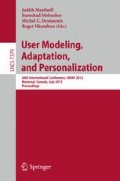Abstract
Current Game-based Learning (GBL) applications often lack features that have been commonplace in conventional e-learning. One of these is the ability to provide players with a personalised experience. The author’s dissertation aims at further establishing adaptivity in GBL as a practical feature through three contributions: An adaptive educational game that fulfills key demands for GBL; an architecture that adapts at runtime according to authored references; and a controlled trial to evaluate effects of adaptivity in a statistically sound way.
Access this chapter
Tax calculation will be finalised at checkout
Purchases are for personal use only
Preview
Unable to display preview. Download preview PDF.
References
Hodhod, R.: Interactive Narrative for Adaptive Educational Games: Architecture and Application to Character Education. PhD thesis, University of York (2010)
Teo, C.B., Gay, R.K.L.: A knowledge-driven model to personalize e-learning. J. Educ. Resour. Comput. 6(1), 3 (2006)
Greitzer, F.L., Kuchar, O.A., Huston, K.: Cognitive science implications for enhancing training effectiveness in a serious gaming context. J. Educ. Resour. Comput. 7(3), 2 (2007)
Farrell, R.G., Liburd, S.D., Thomas, J.C.: Dynamic assembly of learning objects. In: WWW Alt. 2004: Proceedings of the 13th International World Wide Web Conference on Alternate Track Papers & Posters, pp. 162–169. ACM New York (2004)
Weiß, S.A., Müller, W.: The Potential of Interactive Digital Storytelling for the Creation of Educational Computer Games. In: Pan, Z., Zhang, X., El Rhalibi, A., Woo, W., Li, Y. (eds.) Edutainment 2008. LNCS, vol. 5093, pp. 475–486. Springer, Heidelberg (2008)
Zylka, J., Müller, W., Berger, F., Rebholz, S.: Assessing Skills and Abilities in Educational Games – Approaches and Perspectives in terms of Game-based Learning. In: Assessment in Game-based Learning: Foundations, Innovations, and Perspectives. Springer, New York (2011)
Jantke, K.P.: Digital games that teach: A critical analysis. In: Diskussionsbeiträge. Number 22. Institut für Medien- und Kommunikationswissenschaft, TU Ilmenau (August 2006)
Tan, P.H., Ling, S.W., Ting, C.Y.: Adaptive digital game-based learning framework. In: DIMEA 2007: Proceedings of the 2nd International Conference on Digital Interactive Media in Entertainment and Arts, pp. 142–146. ACM, New York (2007)
Krichen, J.P.: Dynamically adjusting to learner’s competencies and styles in an online technology course. In: SIGITE 2005: Proceedings of the 6th Conference on Information Technology Education, pp. 149–154. ACM, New York (2005)
Martens, A.: Ein Tutoring Prozess Modell für fallbasierte Intelligente Tutoring Systeme. Dissertationen zur Künstlichen Intelligenz vol. 281. Akademische Verlagsgesellschaft AKA (2004)
Charles, D., Kerr, A., McNeill, M., McAlister, M., Black, M., Kücklich, J., Moore, A., Stringer, K.: Player-centred game design: Player modelling and adaptive digital games. In: Digital Games Research Conference, Selected Papers Publication, pp. 285–298 (2005)
Van Velsen, L., Van der Geest, T., Klaassen, R., Steehouder, M.: User-centered evaluation of adaptive and adaptable systems: A literature review. Knowl. Eng. Rev. 23, 261–281 (2008)
Berger, F., Müller, W.: Towards an Open Source Game Engine for Teaching and Research. In: Chang, M., Hwang, W.-Y., Chen, M.-P., Müller, W. (eds.) Edutainment 2011. LNCS, vol. 6872, pp. 236–236. Springer, Heidelberg (2011)
Author information
Authors and Affiliations
Editor information
Editors and Affiliations
Rights and permissions
Copyright information
© 2012 Springer-Verlag Berlin Heidelberg
About this paper
Cite this paper
Berger, F. (2012). Evaluating an Implementation of an Adaptive Game-Based Learning Architecture. In: Masthoff, J., Mobasher, B., Desmarais, M.C., Nkambou, R. (eds) User Modeling, Adaptation, and Personalization. UMAP 2012. Lecture Notes in Computer Science, vol 7379. Springer, Berlin, Heidelberg. https://doi.org/10.1007/978-3-642-31454-4_34
Download citation
DOI: https://doi.org/10.1007/978-3-642-31454-4_34
Publisher Name: Springer, Berlin, Heidelberg
Print ISBN: 978-3-642-31453-7
Online ISBN: 978-3-642-31454-4
eBook Packages: Computer ScienceComputer Science (R0)

